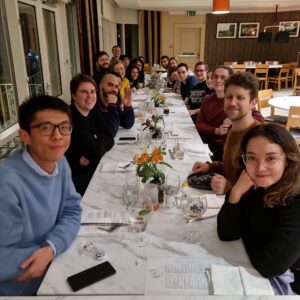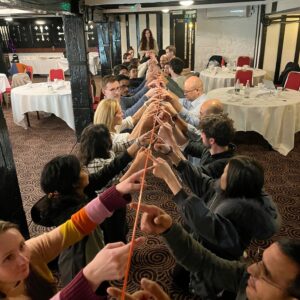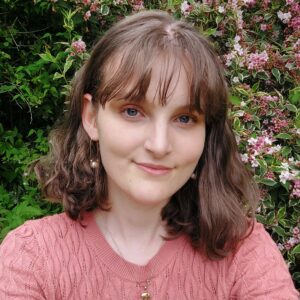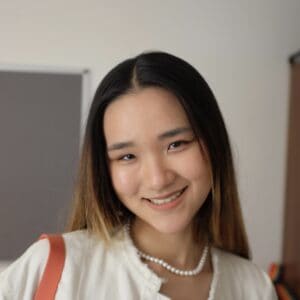PhD/ECR
 SINAPSE is committed to supporting PhD and Early Career Researchers across the network in their development. We hold an annual PhD Welcome Event open to all 1st and 2nd year PhDs throughout SINAPSE, make funds available for exchange trips aiding in forming links at home and abroad, and our Annual Scientific Meeting is the perfect place to begin presenting posters and research in a friendly atmosphere.
SINAPSE is committed to supporting PhD and Early Career Researchers across the network in their development. We hold an annual PhD Welcome Event open to all 1st and 2nd year PhDs throughout SINAPSE, make funds available for exchange trips aiding in forming links at home and abroad, and our Annual Scientific Meeting is the perfect place to begin presenting posters and research in a friendly atmosphere.
Aiding us in supporting you are volunteer representatives from our partner universities who form the Early Career Researcher Committee. Each university has at least 1 PhD and 1 ECR representative and in turn a PhD and ECR from the Committee attends the SINAPSE Executive meetings.
We have online training, and are developing an entrepreneurial course for the SINAPSE network.
We also recognise that sometimes you face difficulties and need support. We have an ECR support page which directs you to resources and help at your home institution.
Early Career Researcher Committee
The Early Career Researcher Committee represents the views of PhD students and Early Career Researchers to SINAPSE so we can better support and respond to the needs of this important part of the imaging community. If you’d like to be a representative please contact Richard Mosses.
Current ECRC Representatives
Aberdeen – PhD Rep Liene Balode; ECR Rep – No Rep at the moment
Dundee – PhD Rep Martina Kopcanova; ECR Rep Yilong Zhang
Edinburgh – PhD Rep Fabian Yii; ECR Rep – No Rep at the moment
Glasgow – PhD Reps Paveekorn Supteranon; ECR Rep Jodi Watt
St Andrews – PhD Rep Alex Backler, ECR Rep – No Rep at the moment
Stirling – PhD Rep Emily Cunningham; ECR Rep – No Rep at the moment
Strathclyde – PhD Reps Claire Rogers; ECR Rep Peter Lukacs
Aberdeen Representatives
PhD Representative – Liene Balode
 Biography: Liene Balode is a 2nd year PhD student in Medical Sciences at the University of Aberdeen. Her research investigates the optimisation of T1ρ MRI for cardiac applications at 3T MRI. Liene’s research interests include T1ρ MRI, cardiac MRI, and image processing.
Biography: Liene Balode is a 2nd year PhD student in Medical Sciences at the University of Aberdeen. Her research investigates the optimisation of T1ρ MRI for cardiac applications at 3T MRI. Liene’s research interests include T1ρ MRI, cardiac MRI, and image processing.
Contact Information:
Email: l.balode.22@abdn.ac.uk
Dundee Representatives
PhD Representative – Martina Kopcanova
 Biography: Martina Kopcanova is a postgraduate researcher currently in the first year of a combined MSc-PhD studentship based in the Psychology Division at the University of Dundee. Her research interests are primarily in the fields of cognitive neuroscience and neuropsychology with a focus on non-invasive electrophysiology like M/EEG. Her current research projects involve investigating neural correlates of metacognition and attentional lapses, as well as biomarkers of Alzheimer’s disease
Biography: Martina Kopcanova is a postgraduate researcher currently in the first year of a combined MSc-PhD studentship based in the Psychology Division at the University of Dundee. Her research interests are primarily in the fields of cognitive neuroscience and neuropsychology with a focus on non-invasive electrophysiology like M/EEG. Her current research projects involve investigating neural correlates of metacognition and attentional lapses, as well as biomarkers of Alzheimer’s disease
Contact information:
Email: m.kopcanova@dundee.ac.uk
ECR Representative – Dr Yilong Zhang
 Biography: Dr Yilong Zhang is currently a postdoctoral researcher in the Department of Biomedical Engineering, School of Science and Engineering, University of Dundee. Yilong obtained his PhD at the University of Dundee in 2022 with research focused on optical coherence tomography (OCT) technology and applications. Yilong’s main research interests are OCT, elastography for medical diagnosis, and tissue-engineering applications. He also has extensive experience in ultrasound and MRI imaging for prostate disease, investigating the bioeffects of low-intensity ultrasound, wound healing, image processing and statistical modelling.
Biography: Dr Yilong Zhang is currently a postdoctoral researcher in the Department of Biomedical Engineering, School of Science and Engineering, University of Dundee. Yilong obtained his PhD at the University of Dundee in 2022 with research focused on optical coherence tomography (OCT) technology and applications. Yilong’s main research interests are OCT, elastography for medical diagnosis, and tissue-engineering applications. He also has extensive experience in ultrasound and MRI imaging for prostate disease, investigating the bioeffects of low-intensity ultrasound, wound healing, image processing and statistical modelling.
Contact information:
Email: y.z.z.z.h.zhang@dundee.ac.uk
Phone: +44 (0) 7731960231
Edinburgh Representatives
PhD Representative – Fabian Yii
 Biography: Fabian Yii is a multi-disciplinary PhD candidate based at the Institue for Regeneration and Repair in Edinburgh BioQuarter. His research focuses on developing individualised prediction models for myopia (short-sightedness), which is a highly prevalent condition characterised by blurred distance vision (often because the eyeball is too long). Another focus of his research is to predict the development and progression of pathologic myopia, which is a sight-threatening disease often conflated with “high myopia”. He aims to tap into artificial intelligence to predict these conditions from routinely acquired photographs or scans of the back of the eye. The goal of his research is to accelerate the advancement of precision medicine in clinical practice, which in the context of myopia means “myopia treatment of the right intensity for the right individual at right time”.
Biography: Fabian Yii is a multi-disciplinary PhD candidate based at the Institue for Regeneration and Repair in Edinburgh BioQuarter. His research focuses on developing individualised prediction models for myopia (short-sightedness), which is a highly prevalent condition characterised by blurred distance vision (often because the eyeball is too long). Another focus of his research is to predict the development and progression of pathologic myopia, which is a sight-threatening disease often conflated with “high myopia”. He aims to tap into artificial intelligence to predict these conditions from routinely acquired photographs or scans of the back of the eye. The goal of his research is to accelerate the advancement of precision medicine in clinical practice, which in the context of myopia means “myopia treatment of the right intensity for the right individual at right time”.
Follow his work on ResearchGate (https://www.researchgate.net/profile/Fabian-Yii-2/contributions) and GitHub (https://github.com/fyii200)
Contact Information:
Email: fabian.yii@ed.ac.uk
Glasgow Representatives
PhD Representative – Paveekorn Supteranon
 Biography:
Biography:
Interests:
Ultrasound is ubiquitous in diagnostic medicine to image tissue non-invasively. To improve image quality, tiny microbubbles of gas are used as a safe and non-toxic contrast agent. However, despite several in-man studies now having taken place, delivery efficiencies remain low. It is also challenging to get these microbubbles into solid tumors where they are needed because of the tumor micro-environment. An innovation, phase-change nanodroplets could provide the solution. Their smaller size means they can escape the vasculature and better penetrate tissues.
The aim of my PhD project is to to fabricate an ultrasound contrast agent to use as an enhance contrast agent of the ultrasound for diagnosis and therapeutic reason.
Keywords: theranostics, phase-change nanodroplets, ultrasound, cancer.
Contact Information:
Email: 2989546S@student.gla.ac.uk
St Andrews Representatives
PhD Representative – Alex Backler
Biography: Alex Backler is a 1st year EASTBIO PhD candidate in Psychology at St Andrews University. His research investigates multisensory interactions and its behavioural benefits using EEG and computational modeling. His research interests are decision-making and cooperation. To investigate such interests, he has taken a multidisciplinary approach by using tools from several different disciplines (i.e. primatology, psychology, neuroscience, and evolutionary game theory) such as observational studies, behavioural experiments, neuroimaging, computational modeling, and computer simulations.
Contact Information:
Email: aflb1@st-andrews.ac.uk
Stirling Representatives
PhD Representative – Emily Cunningham
 Biography: Emily Cunningham is a 1st year PhD student in the Psychology department at the University of Stirling. Her research involves finding reliable neural and physiological markers of attentional lapses, both in the lab and outside of the lab, in more ‘real-world’ settings.
Biography: Emily Cunningham is a 1st year PhD student in the Psychology department at the University of Stirling. Her research involves finding reliable neural and physiological markers of attentional lapses, both in the lab and outside of the lab, in more ‘real-world’ settings.
Contact information:
Email: e.k.cunningham@stir.ac.uk
Strathclyde Representatives
PhD Representative – Claire Rogers
 Biography: Claire rogers is a 1st year multi-disciplinary PhD student working within the NeuraSearch laboratory at the University of Strathclyde. Having completed her BSc and MSc in Psychology, her research interests include Alzheimer’s Disease, particularly its management and detection, Mild Cognitive Impairment, neuropsychology, and the integration of computing science and psychology. Her current research involves exploring the neuropsychological underpinnings of information relevance in Alzheimer’s Disease and Mild Cognitive Impairment.
Biography: Claire rogers is a 1st year multi-disciplinary PhD student working within the NeuraSearch laboratory at the University of Strathclyde. Having completed her BSc and MSc in Psychology, her research interests include Alzheimer’s Disease, particularly its management and detection, Mild Cognitive Impairment, neuropsychology, and the integration of computing science and psychology. Her current research involves exploring the neuropsychological underpinnings of information relevance in Alzheimer’s Disease and Mild Cognitive Impairment.
Contact information:
Email: claire.rogers@strath.ac.uk
ECR Representative – Peter Lukacs
 Biography: Dr Peter Lukacs is a research fellow at the Centre for Ultrasonic Engineering, University of Strathclyde. He currently works on Scattering-based Ultrasonic Arrays, which is supported by his EPSRC Doctoral Prize. Peter obtained his BEng and PhD at University of Strathclyde in 2017 and 2023, respectively. His PhD work was mainly focused on developing a system and imaging algorithms for high quality, non-contact, 3D ultrasonic imaging using Laser Induced Phased Arrays. His main research interests include non-destructive testing, ultrasonic imaging, 3D visualisation, remote sensing and phased array design.
Biography: Dr Peter Lukacs is a research fellow at the Centre for Ultrasonic Engineering, University of Strathclyde. He currently works on Scattering-based Ultrasonic Arrays, which is supported by his EPSRC Doctoral Prize. Peter obtained his BEng and PhD at University of Strathclyde in 2017 and 2023, respectively. His PhD work was mainly focused on developing a system and imaging algorithms for high quality, non-contact, 3D ultrasonic imaging using Laser Induced Phased Arrays. His main research interests include non-destructive testing, ultrasonic imaging, 3D visualisation, remote sensing and phased array design.
Contact information:
Email: peter.lukacs@strath.ac.uk